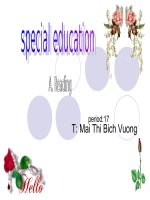AV 10 Unit 4 Special education
Bạn đang xem bản rút gọn của tài liệu. Xem và tải ngay bản đầy đủ của tài liệu tại đây (121.16 KB, 27 trang )
CE41a CE 41
Date : ngaøy thaùng
Time : giôø phuùt ~ giôø phuùt
Name: _____________________
UNIT 4: SPECIAL EDUCATION
A. Pronunciation
Choose the word that has the underlined part
pronounced differently from the others
1.a. top b. wrong c. talk
2.a. job b. four c. sport
3.a. teaches b. misses c. likes
4. a. busy b. duty c. beauty
Choose the word whose main stress is placed
differently from the others
1. a. attend b. realise c. promise
2. a. education b. different c.
graduation
3. a. timetable b. technology c. physics
TLBT10 BTCB
1
4. a. favorite b. interested c. continue
CB41b
B. The + Adjective
“The + adjective” được dùng để nói về những
nhóm người trong xã hội nhất là những nhóm người
có một tình trạng thể chất hoặc một hoàn cảnh xã hội
đặc biệt.
“The + adjective” mang nghóa số nhiều + V
số nhiều
_ The young have the future in their hands.
the blind (người mù), the deaf (người điếc), the
dead (người chết), the disabled (người tàn tật), the
injured (người bị thương), the healthy (người khỏe
mạnh), the living (người còn sống), the jobless (người
thất nghiệp), the old (người già), the poor (người
nghèo), the rich (người giàu), the sick (người bệnh),
the unemployed (người thất nghiệp), the young
(người trẻ), the mentally ill (người bệnh tâm thần).
TLBT10 BTCB
2
TLBT10 BTCB
3
CE42a CE 42
Match the phrases in column A with appropriate
information from column B
A
1. The deaf
2. The hungry
3. The dead
4. The poor
5. The homeless
6. The unemployed
7. The blind
B
a. people who died
b. people who do not
have enough money
c. people who are
without place to live
d. people who can’t hear
e. people who do not
have enough food to
eat
f. people who are
unable to see
g. people who do not
have jobs
1. _______ 5. _______
2. _______ 6. _______
3. _______ 7. _______
4. _______
TLBT10 BTCB
4
CE42b
C. Used to + bare infinitive
Use
Được dùng để nói về một thói quen trong quá
khứ mà nay không còn nữa.
_ I used to eat a lot of candy but now I only eat fruit.
Form
Positive: S + used to + V
_ Bob used to drink much wine.
Negative: S + did not use to + V
_ Bill didn’t use to go out when he was young.
Interrogative: Did + S + use to V…?
_ Did you use to smoke?
No, I didn’t / Yes, I did.
TLBT10 BTCB
5
CE43a CE 43
Change the following sentences into the negative
and interrogative form
_ Nam used to smoke a lot.
→
Nam didn’t use to smoke a lot.
→
Did Nam use to smoke a lot?
1. They used to live in Paris.
_______________________________________
________________________________________
2. He used to drink coffee after breakfast.
_______________________________________
_______________________________________
3. David used to get up early.
_______________________________________
_______________________________________
4. I used to stay with foreign students in a house.
_______________________________________
_______________________________________
TLBT10 BTCB
6
CE43b
Put the verb in bracket into the correct form
_ Lan (not / use) didn’t use to go shopping last year.
1. _________ Mai (use) _________ to be your best
friend?
2. The poor (have) _________ difficulty in life.
3. Hoa used (watch) _________ TV a lot.
4. _________ you use (drink) _________ much
beer?
5. The unemployed (find) _________ it difficult to
earn much money.
8. _________ you (see) _________ that film last
week?
9. Hanh (not / use) _________ to do exercise when
she (be) _________ young.
10. The sun (warm) _________ the air and (give)
_________ us light.
11. They always (make) _________ noise in the
class.
12. They would really like (visit) _________ the art
gallery on Friday.
13. He (not / write) _________ to me recently.
TLBT10 BTCB
7
CE44a CE 44
D. Review Gerund (OÂn danh ñoäng töø)
- Consider
- Avoid
- Suggest
- Keep
- Mind + Ving
- Enjoy
- Regret
- Can’t help
- Go on…
Choose the correct answer
_ She suggested (to have / having) dinner early.
1. Do you consider (to go / going) on holiday next
month?
2. Mary often (advises / advising) me to study
harder.
3. Would you mind (to open / opening) the door?
4. Mai used to (enjoy / enjoying) coffee very
much.
TLBT10 BTCB
8
5. I didn’t (use / used) to drink wine.
6. He is surprised at (to see / seeing) me.
CE44b
Put the verbs in brackets into the correct form
_ John kept (talk) talking to Mary.
_ John (see) saw Mary last night.
1. I can’t help (laugh) _________ when I hear him
telling a story.
2. I usually avoid (go) _________ to parties.
3. She usually (advise) _________ doing exercise
in the morning.
4. He used (help) _________ the poor.
5. The homeless (be) _________ very miserable
because they must live outside.
6. He (not / use) _________ to drink coffee when
he was young.
7. Ann (not / go) _________ to bed early every
evening.
8. _________ you (write) _________ to her last
week?
9. _________ he (use) _________ to swim last
year?
TLBT10 BTCB
9
10. Because of (get) _________ up late, I didn’t
have breakfast.
11. She regretted (tell) _________ him a lie.
CE45a CE 45
Find out the mistake from the underlined word
_ The sick needs to be looked after, so money must be
A B C D
spent on hospitals.
→
caâu B: need
1. What is the government doing to help poor?
A B C D
2. Vicky didn’t used to play football in the afternoon.
A B C D
3. What do you use to do when you felt afraid?
A B C D
4. She doesn’t mind to lend you some money if you
A B C
need.
D
5. Does he usually visits you when he has free time?
A B C D
TLBT10 BTCB
10
6. I remember to see it on the table yesterday.
A B C D
TLBT10 BTCB
11
CE45b
Choose the best answer
1. The old ________ a lot of experience of life.
a. has b. have c. is having d. had
2. I ________ like going to pop concerts when I was
a teenager.
a. would b. used to c. used d. could
3. I didn’t ________ films every night.
a. used to see b. use to see
c. use to seeing d. used to seeing
4. Did you ________ to Mary about my problem
last night?
a. talked b. talking c. talk d. to talk
5. She regrets ________ all his money.
a. spending b. spend
c. to spend d. to spending
6. John doesn’t ________ football everyday.
a. plays b. played c. play d. playing
7. ________ he usually ________ up late?
a. Is / get b. Does / gets
c. Does / get d. Did / get
TLBT10 BTCB
12
CE46a CE 46
Date : ngày tháng
Time : giờ phút ~ giờ phút
Name: _____________________
UNIT 4: SPECIAL EDUCATION
E. “Which” as a connector
Đại từ quan hệ “which” ngoài việc thay thế cho
vật còn có thể thay thế cho toàn bộ mệnh đề đứng
trước.
_ The film was very interesting, which surprised me.
Chú ý: trước “which” luôn có dấu phẩy.
Join the following sentences with “which”
_ Our flight was delayed. This was a pity.
→
Our flight was delayed, which was a pity.
1. Jim passes his driving test. This surprised
us.
_____________________________________
2. David helped me wash up. This was very
kind of him.
_____________________________________
3. My phone is out of order. It’s a real
nuisance.
_____________________________________
4. It rained all night. This was good for the garden.
TLBT10 BTCB
13
_____________________________________
TLBT10 BTCB
14
CE46b
Review to infinitive
(Ôn động từ nguyên mẫu có “to”)
- Would like
- Want / Need
- Decide
- Plan + to V
- Expect
- Threaten
- Hope…
_ I hope to meet you soon.
Choose the correct answer
_ He wants (to meet / meeting) the boss at once.
1. Would you like (having / to have) some tea?
2. Tom doesn’t mind (to work / working) at night.
3. Jane used (smoke / to smoke) a lot.
4. The young (have / has) the future in their hand.
5. We (went / go) out for a walk last night.
6. Jill isn’t on the phone, (which / this) is a pity.
7. Would you mind (to wait / waiting) for me.
TLBT10 BTCB
15
CE47a CE 47
Put the verbs in brackets in the correct form
_ He threatened (leave) to leave the party if I didn’t
stop making noise.
1. She expects (meet) ________ John tomorrow.
2. He plans (go) ________ to Paris next week.
3. Do you consider (have) ________ a party
tonight?
4. Would you like (go) ________ out with me
tonight?
5. She often (cook) ________ in the evening.
6. The old (be) ________ often sleepless.
7*. ________ Mai usually (go) ________ to church
every Sunday?
8*. Ann (not / come) ________ to the party last
night.
9*. ________ you (see) ________ John yesterday?
10. He used (eat) ________ ice cream.
11. He suggested (climb) ________ up that
mountain.
12*. You had better (study) ________ harder.
TLBT10 BTCB
16
CE47b
Find out the mistake from the underlined words
_ He doesn’t need meeting Mary because he is very
A B C D
busy now.
→
caâu A: to meet
1. He kept to study Math until he entered the
A B C D
university.
2. Because she was a designer, she decided buying a
A B C D
new computer.
3. I didn’t used to stay up early but now I must stay
A B C
up early for the exam.
D
4. Neil has passed his exams, that is good news.
A B C D
5. It is said that he robbed rich and gave the money to
A B C D
the poor.
6. We congratulated him on gets the job.
TLBT10 BTCB
17
A B C D
TLBT10 BTCB
18
CE48a CE 48
Choose the best answer
1. Our flight was delayed, _________ was a pity.
a. this b. it c. which d. that
2. He enjoys _________ everyday.
a. swims b. swimming c. to swim d. swim
3. He didn’t _________ alone.
a. used to live b. use to live
c. used to living d. live
4. When I’m tired, I would like _________ TV.
a. to watch b. watching
c. watch d. to watching
5. John _________ for Ha Noi last week.
a. leave b. leaves c. leaving d. left
6. Does she _________ you clearly?
a. know b. knows
c. knowing d. to know
7*. Mary _________ books at the moment.
a. reading b. is reading
c. reads d. read
8. I stopped _________ because I was tired.
a. working b. to work
c. worked d. to working
TLBT10 BTCB
19
CE48b
Review the past perfect
(Ôn thì quá khứ hoàn thành)
Form
S + had V
3
+ O
Use: diễn tả hành động trước điểm thời gian hoặc
trước hành động trong quá khứ.
_ When I had done all my homework, I watched TV
last night.
Chú ý:
- Before / By the time S + V
2
, S + had V
3
- After S + had V
3
, S + V
2
_ By the time he arrived, all his classmates had left.
Put the verbs in brackets in the simple past or the
past perfect
_ We (finish) had finished our work before 10 o’clock.
1. After it (be) _________ dry for months, it rained
yesterday.
2. Before I (return) _________ home, my wife had
prepared the meal.
3*.Why did she get angry with him?
Because he (break) _________ her favorite vase.
TLBT10 BTCB
20
CE49a CE 49
Choose the correct answer
1. By the time I arrived at the station, the bus
________.
a. left b. had left c. has left d. leaves
2. After John ________ to Saigon, he visited his
relatives.
a. has come b. came
c. had come d. comes
3. When I was a child, I ________ the violin.
a. play b. had played c. playing d. played
4. We ________ in London for 10 years and then
we moved here in 1998.
a. have lived b. lived c. live d. had lived
5. We ________ them before the meeting
yesterday.
a. hadn’t met c. not meet
b. didn’t meet d. don’t meet
6. They ________ their children to the zoo
yesterday.
a. took b. had taken c. take d. have taken
7. John ________ in New York for ten years before
he moved to Vietnam.
TLBT10 BTCB
21
a. had lived b. lived c. has lived d. lives
TLBT10 BTCB
22
CE49b
Put the verbs in brackets in the correct form
_ Mai often (phone) phones me at night.
1. He usually (play) ________ tennis in the
afternoon.
2. After she (clean) ________ the floor, she went
out.
3. Before we got to the movie, the film (begin)
________
4. When I was young, I (like) ________ milk.
5. John never (drink) ________ milk.
6. ________ she sometimes (listen) ________ to
music?
7. ________ you (write) ________ to him last
week?
8*.When I came to the box office, they (already /
sell) ________ all the tickets.
9*. The alarm clock (go) ________ off when she
woke up.
10. I (not / see) ________ John last night.
11*.________ she (do) ________ the test before 8
o’clock yesterday?
12*.When I (finish) ________ the exercise, I went
out.
TLBT10 BTCB
23
13. I (wait) ________ for you for half an hour.
TLBT10 BTCB
24
CE50a CE 50
Word form
Verbs Nouns Adjectives Adverbs Meanings
photograph photography photographic
nhiếp ảnh
compete competition competitive competitivel
y
tranh đua
disable disability disabled
tàn tật
pride pride proud proudly
tự hào
care care careful carefully
cẩn thận
Give the correct forms of the words in brackets
_ She looked with pride at the result of her work
(proud).
1. Yesterday I saw a _________ child in a wheel
chair on the pavement (disable).
2. There are many kinds of _________ equipment
in this studio (photograph).
3. Do you think of taking part in the _________
(compete)?
4. They display the golden cup _________ (pride).
5. He always drives _________ (care).
TLBT10 BTCB
25









